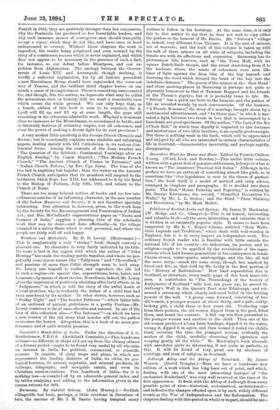Barrier*. By Gabriel Setoun. (John Murray.) — Scottish village-life has
been, perhaps, a little overdone in literature of late, the success of Mr. J. M. Barrie having tempted many writers to follow in his footsteps. At the same time, it is only fair to this author to say that he does not seek to copy either the pathos or the humour of Mr. Barrie. Mr. " Setoun's " village is, indeed, very different from Thrums. It is the seat of miners, not of weavers ; and the bulk of this volume is taken up with the talk of these miners on all sorts of subjects, including the female sex with its affections and coquetries. Barncraig has its picturesque bits however, such as "the Town Hall, with its square Dutch-built steeple, and the street stretching from it to the harbour, where the masts of schooners were seen like lines of light against the deep blue of the bay beyond, and throwing the wood which fringed the bend of the bay into the indefinite distance." The gossip of the miners at the Haw Head' and other meeting-places in Barncraig is perhaps not quite so piquantly humorous as that of Tammaa Haggart and his friends at the Thrum's pigstye, but it is probably truer to life. Mr. " Setoun " has a quick eye both to the humour and the pathos of life as revealed mainly by such conversations. Of the humour, "A Prosaic Romance," the story of a marriage brought about by a matrimonial advertisement, and "In Statu Quo," in which is nar- rated a fight between two rivals in love that is interrupted by a hare-hunt, are good specimens. Of the pathos, "The Last of the Six o'Clock Bell," in which true dignity is imparted to the fortunes and misfortunes of two idiot brothers, is an equally good example. But there is nothing weak in the book, which will be appreciated and enjoyed by all who are interested in certain characteristics of life in Scotland,—characteristics inevitably, and perhaps rapidly, disappearing.


































 Previous page
Previous page